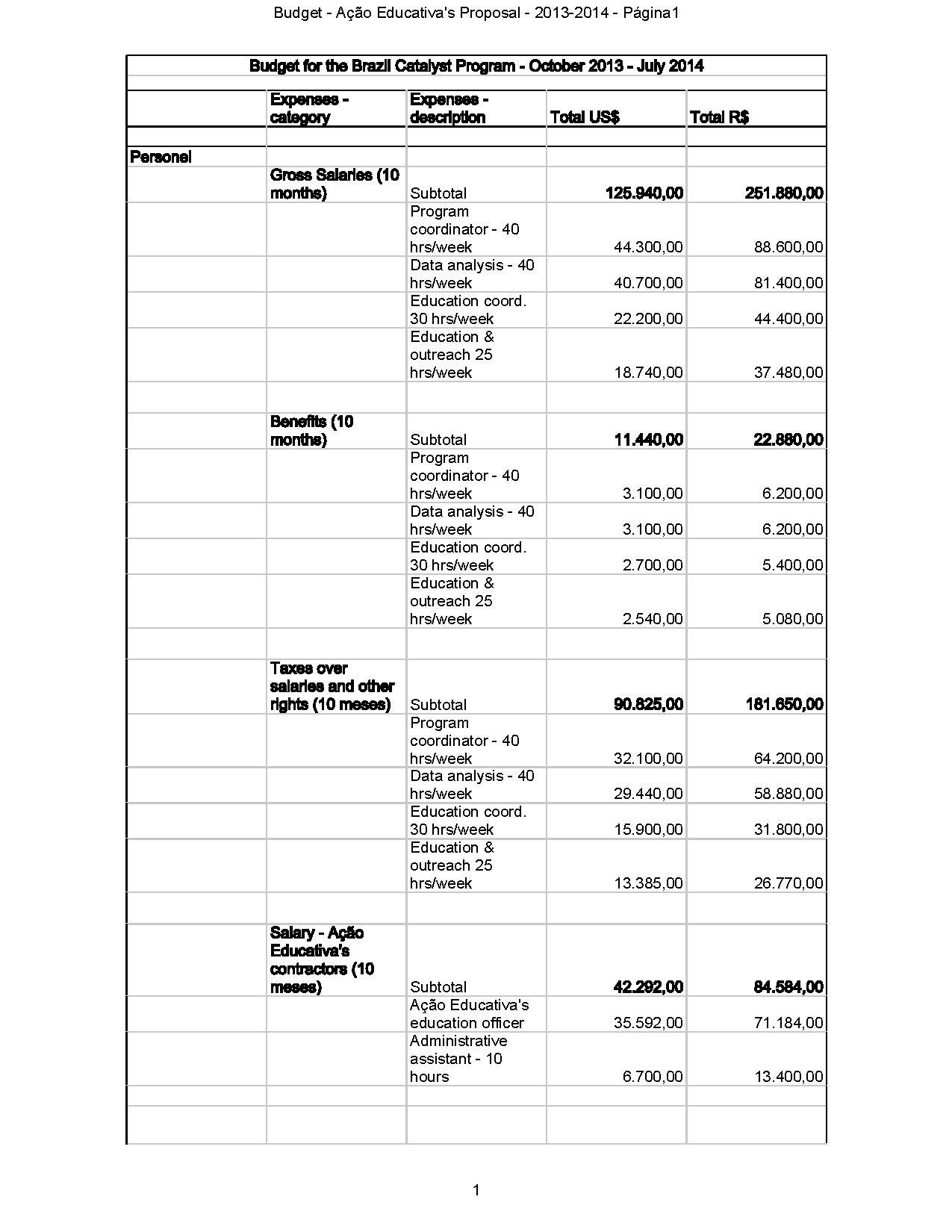Programa Catalisador do Brasil/Planejamento 2012-2013/Parcerias/Ação Educativa/Proposal/Budget
October 2013 - July 2014
Budget[edit]
Total planned budget: US$ 557,863,36
Economic context in Brazil[edit]
Considering we’re in a global movement and amounts may be perceived in many different ways, we bring some comparisons that may help understand why and how this budget reaches such amount.
The costs of employing[edit]
Considering Brazil in an emerging economy (but still a developing country), one may think it’s a cheap country, where the purchase power of US dollar is high. On the contrary, Brazil has been under high inflation rates in the last years compared to its salaries, and although unemployment rates have improved in the last decade, labor costs are still very, very high. According to the Bereau of Labor Statistcs, in 2012, for each hourly pay for time worked on the value of 5.95, the labor costs achieved 11.20, almost twice the amount [1] paid. Brazil has one of the highest costs for employment: the costs over gross salary may achieve almost 60% the amount paid [2][3]. For the sake of comparison, while taxes for employers in Brazil achieve 57,56%, in India, employers pay 3,67% [4]. Over the net salary it may achieve almost 100%. Labor rights in Brazil are taken very seriously by the Ministry of Labor, which can apply huge fines for employees in case those rights are not respected. Over the amount paid, the employee will still have it deducted from his/her salary income rate (from 0 to 27,5%) and social insurance (from 8% to 11%). Over the gross salary employers pay an additional of about 27% for social security, plus 8% for dismissal fund and other taxes and provisioned costs for the time of a future dismissal.
The costs of maintaining an organization[edit]
Also, maintaining a formal organization in Brazil is quite expensive (also because of this kind of costs, the expression “Custo Brasil” became a very common expression). This makes all organizations, especially those whose incomes are usually based on projects and programmes (and not in manufacturing and getting profit out of selling products), insert lines regarding institutional costs in all projects they get funding for. There are many expenses that are usually not “dividable” (location and maintenance of the venue, administration costs, electricity, water, legal support/consultancy, accountants etc). Administrative rates usually vary from 10% to 30%, depending on the costs involved in general institutional and administrative support.
Cost of living[edit]
Brazil’s cost of living is getting higher every year. Again, for the sake of comparison with our “brother project”, the Catalyst Program in India, the cost of living in São Paulo is 147% higher than in Bangalore [5]. When compared to San Francisco, it’s about 35% cheaper [6]. Two years ago Brazil’s cost of living had overcome US’s cost of living [7]. However, in 2013 the US dollar achieved its highest rate since 2008. When we started designing the budget, dollar was still under R$ 2,00. The exchange rate for receiving dollars in Brazil is now between 2.25 and 2,30. To avoid major risks in this unstable economy, though, we’d better be conservative about the dollar rates now and report back compensating the difference when it’s time to receive the second installment from Wikimedia Foundation.
- ↑ Labor costs in Brazil
- ↑ Custos para empregadores são maiores no Brasil
- ↑ Brasil tem maior carga tributária entre países
- ↑ Brasil é campeão de baixo desemprego e de alto custo do emprego
- ↑ Comparing cost of living São Paulo x Bangalore
- ↑ Comparing cost of living São Paulo x San Francisco
- ↑ Custo de vida no Brasil supera o dos EUA

